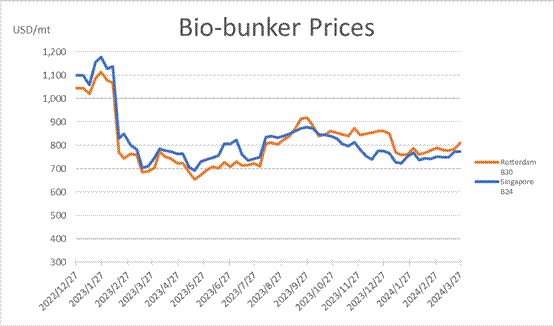|
Indications for VLSFO with a bio-mix of a maximum of 30% in Rotterdam were at $800.00-820.00/mt and a bio-mix of maximum of 24% in Singapore were at $764.00-784.00/mt, both rising slightly from the previous week. Deals were reportedly done at a premium of $205-215/mt to FOB Rotterdam Barges 0.5%S fuel oil and at a premium of $130-145/mt to Singapore 0.5%S fuel oil. The European Union Allowance (EUA) futures price of carbon dioxide (CO2) was currently in the Euro 60's/mt.
Biofuel prices increased in Rotterdam due to firm demand in Used Cooking Oil (UCO). Along with low refining volumes in oil products, biofuel supply also declined, sending prices of B30-VLSFO higher. Nevertheless, the upper-end of B24-VLSFO prices were capped following weak demand in the spot market. Moreover, demand was diluted as buyers could procure cheaper biodiesel from ports such as those in Malaysia.
The recent rise in UCOME prices from China led to an increase in biodiesel prices. This was attributed to a rise in sales prices of palm oil and palm kernel shells (PKS) from Malaysia and Indonesia, which also caused an increase in the price of UCO. Additionally, the increase in UCOME exports from China to the US has contributed to a global rise in UCOME prices.
However, the upward momentum in prices was limited. Demand was not increasing for sustainable aviation fuel (SAF), land transportation fuels such as for trucks, and for marine fuels, leading to a growing sense of surplus of liquid biofuels. Due to the current weakness in demand, major energy companies have announced their withdrawal from biofuel refining. Chevron's subsidiary, Chevron Renewable Energy, announced in March the closure of its owned biodiesel refining plants in Ralston, Iowa, and Madison, Wisconsin. The closure was due to a deterioration in profitability.
The International Civil Aviation Organization (ICAO) had set a goal to reduce carbon emissions from international aviation by 5% by using clean energy such as SAF by 2030. Similarly, the International Maritime Organization (IMO) aimed to reduce greenhouse gas emissions from international shipping by 20-30% compared to 2008 levels by 2030 as well. While various industries continued to switch fuels gradually, a comprehensive transition from existing fuels was not showing significant progress, and this contributed to a slackening in supply/demand fundamentals.

|
<PR> Information
|
|
The Bunker Oil report covers bunker oil prices and spot trades at 40 major ports around the world.
It also contains the trend of future fuels such as LNG bunkers and bio-bunkers, container handling volumes, and port operations. LNG bunkers and bio-bunker prices are reported on a weekly basis.
If you learn more, please click the icon on the right side.
|

|
|




